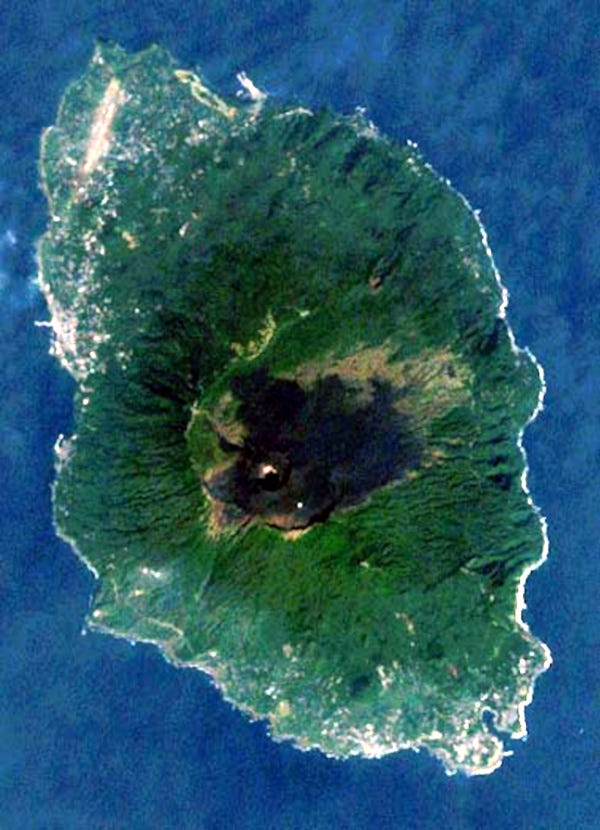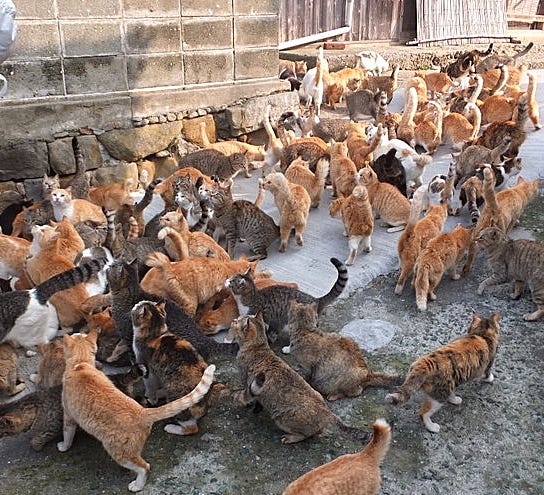At this very moment, I’m eating chocolate candy and drinking red wine. It will be my main meal of the day because I refuse to leave this quaint and yet, beautiful Japanese residence. From my window, I can see the Innomaru House, an inn that I have heard serves exquisite Japanese food. Their main dish, and it seems that this food originated on this island of Izu Ōshima, is called Kusaya, better known to English speakers as “Stink Fish.” If one is to describe the scent, it is like smelling a field of cat’s urine all at once. It stings the eyes and makes the throat stop operating. One tends to hold the saliva in one’s mouth in fear that it has been tainted with the scent of the Kusaya dish. I have no understanding of how anyone human can digest such a monster. It is usually grilled on a coal burner, and I have to imagine that the scent from the cooking must cause severe stress to the birds flying over the area.
I came to this island because I needed to face a landscape that was hostile to my sense of being. I have lived in the most elegant apartment on Saint Germain des Prés and dined with gamblers from the Arizona desert to taste the sweet taste of a ripe orange on Sunset Boulevard. Yet, I have never been a part of a world where I can die at a second’s notice. The Ōshima island is one of the seven Izu Islands in Japan. On the other hand, it is the island with a significant earthquake fault running underneath this area and an active volcano that can blow up at any time. The real reason I’m here is that I want to die. Or, at the very least, be at the front gate of death’s entrance.
For the last several years, I have been working on my novel and a theater presentation of that work, and all the costs have come from my pocket. I’m a rich man, but even in the world of great economics, there is a limit. And now, I’m approaching the limit of no return. I self-published my work of fiction, Impressions of the Izu Ōshima due I couldn’t find a publisher who would do it justice. The book must be printed with hand-made rice paper and each page of a particular color. When someone sees or reads my book, it must appeal to all their five senses. Such a project like that is costly.
When the book, surprisingly, failed to sell, I decided to turn it into a huge theatrical spectacle. This, of course, was even more expensive than producing my book. To save money, after all, it is my vision; I made myself into the director, as well as its producer. I hired a clothes designer, a set designer, a composer, a lighting man, 15 dancers, and five actors - Both female and male, as well as a performer who one can’t tell what gender they are. And a food caterer to handle meals for the crew and actors. Of course, I have strict rules that ‘Stink Fish” cannot be served under any circumstances. I couldn’t find a theater to rent, so I bought a theater here on Izu Ōshima, which was easier to do than renting the damn place. This promises to be a failure, but... the artistic life is a series of failures. I got used to the lifestyle.
Since I’m on the island, I got a group of artists and actors here to help me to envision my work. Besides buying the theater here, I also purchased the abandoned elementary school, Habu Elementary School, to house the crew and have plenty of rehearsal room. My main office is what used to be the principal’s office. I felt that the administrators and students heard the volcano was about to erupt, and they all left without taking anything. I have a trophy display of past baseball games, now entirely forgotten, and photographs of previous classes, where perhaps, the students dead and their teachers.
Although I wrote the novel, I find myself revising my book for the use of the stage spectacular. It’s interesting how one thing can work on paper but not on a set. So, I have to re-write the book for the stage version. The creative life is hard working alone, but it is just bonkers to cooperate with a whole crew, and they’re just sitting there, watching you. It is like that one time when I rented the entire restaurant in New Orleans and hired the whole staff to serve only me. It was right after Katrina, so I think I even got a discount on the whole deal. At first, I figured watching people watch me while I ate was excellent, but I became self-conscious and lost my appetite. I was afraid they would judge me by my taste in food and how I ate it. I then asked the entire crew to turn around while I ate my meal. But that made it even worse. So now, I’m getting that feeling as I write the script for the stage spectacular and having everyone wait or watch me as I work. I should have them do something, but I can’t figure out what to tell them. I yelled out for the costume designer to come over to my desk. I asked her to research the women of Ōshima and what they wore. I requested that she either brings me photographs or do drawings and report back to me as soon as possible. She said “yes,” and went off to her studio in one of the many classrooms here at the school. I felt good when I request a service from her. It even brought some color back to my cheeks.
It seems the theater is too expensive to run, so I’m going to transfer the show to the school’s gymnasium. It’s large, and one can build a sizable stage that will fit our production, which will be gigantic. I have to sell the theater right after buying it - and I think I have to give a deep discount to get rid of the blasted structure. I tend to buy things without thinking about them afterward. Then it takes me a couple of days to realize I made the wrong purchase. My immediate goal is to get rid of whatever I bought because if I keep it, this tends for me to get depressed. And believe me, that is one thing no one wants to see here. When I’m in a blue funk, I can turn the whole room into a reflection of my pain and anguish. I should burn down the theater and get it over with.
But first, I need to get my crew to tear the seats out so we can set them up in the gymnasium. Also maybe the stage should be carefully removed and placed in the gym. I now realize I need to go to the core of nothing being there and work it up with something spectacular. When the landscape is blank, the artist can fill it out in a manner that is entirely up to them. Izu Ōshima will be my blank canvas, and I will make it into a great piece. I must figure out what to take out of my book to have manageable work on the stage. The novel is almost 1,000 pages, and I cannot put the book's entire length onto the stage. Or can I? I’m paying for this, and I already saved money by giving up the theater, so why not put the money into the production of the full version that’s my novel? If I shorten the theatrical production due to budget concerns, I would likely cheapen the work, which can’t happen under my watch.
The decision to do the whole book and use that as the basis for the stage production is a fantastic idea. The smile on my face is as big as this island, which is pretty big. But I must remember that my crew is here, and I don’t want them to see me smiling out of the blue. I need to engage with them. I ask for the set director to come to the table. He does because he is only five feet away from me and the table. I ask him to draw some sets for me. I told him it takes place in contemporary times here on the island, but there are scenes with samurai warriors and when the Nazis briefly landed here on the u-boat. I called the costume designer to remind her we needed some SS uniforms made up as well as the samurai and contemporary clothing.
The narration of the novel and play is based on my life. I first came to Izu Ōshima ten years ago. I rented an ocean liner for myself with an entire crew on deck, and one of the places we set out for was this island. I was never curious about Japan, but I was fascinated by the thought of an island part of Japan. Even though they share the same city government with Tokyo, I sense the island people here are prideful that the sea around them separates them and sees themselves as a separate entity. I have always been attracted to the islands because I feel like an island. I keep moving around the world because I don’t want to be part of something. I instead float from one land to another. The first exotic island I visited was Hawaii, and I was told then that Ōshima Island is a sister to Hawaii. I often wondered what that exactly meant. So I went to Ōshima to find out for myself.
It seems nothing like Hawaii. For one, this is a much more fatal landscape than the 50th state of the Union. When I first got off the boat and walked on the land, I felt shaking underneath my feet. At first, I thought I had caused it, but the truth is that there is a significant fault underneath the island. One has to make sure that one steps lightly around the island. Then as I walked on, I came upon a family of snakes, which according to my travel guide book to Izu Ōshima, they’re all poisonous, and in fact, are the cause of the number one death here on the island. The number-one enemy of the snake is the cats that live on this island. All of them are wild but look exactly like a domestic cat one sees on Facebook or a Hallmark card. It’s eerie to come upon an island of kitties, and all of them looked like they couldn’t give a shit if you’re here or not. Not one cat here comes to me when I say “kitty kitty.” They somehow look even more indifferent to me than if I stayed silent.
In the middle of the night, one can hear a giant purring noise. It seems that cats here purr at the same time and moment - Approximately around 1 AM. Why? There is no answer for this, but I did write it in my production and was thinking of making it into a musical piece for the show. There is a natural sense of intensity when you hear perhaps a thousand cats (or more) purring simultaneously. It sounds tribal. This is a perfect sound for some of the scenes I’m writing. I asked my crew if it was possible to round up at least a thousand cats and if we could get the beasts to purr at once and at a given moment. Everyone looked at me like this was an impossible request. On the other hand, it is the artist's job to devise such visions, or they will not happen.
To trap the cats, I purchased a ton of cow’s milk in Japan and shipped it to the island. There is an abandoned Olympic-sized swimming pool in the school, and I ordered the crew to fill the pool up with milk. The best time to do this was at night. I figure the milk would be spoiled by daylight, and knowing how cats enjoy things or have a particular aesthetic, they would not touch spoiled milk. And also, the night is crucial because I think cats would be attracted to come to the school if they believed everyone was asleep. So I also instruct the entire crew to pretend they are sleeping by fakery snoring loudly. A cat can pick up sounds more than humans - so they probably know the snoring sound of a human and therefore feel that it is safe to come onto the school property.
The theory is that once we attract a sizable amount of kitty cats, we will throw a net and capture them. As we arranged the tanks to come by in the early dark evening, they pumped the milk into the pool, silently leaving like it didn’t happen. Afterward, I had the crew turn off every light in the school, and then we all snored as loudly as possible. This was hard work because I think we had to snore for at least a couple of hours before the first cat showed up. Alas, with patience, a few more showed up, and then they came in ten’s and twenty’s. Eventually, I think we had 500 cats in one place. I decided we should throw the net now because I was afraid the cats there now would soon leave. 1,000 were the goal, but I could live with around 500. Ten or twelve crew members dropped a net in the area, and some cats escaped, but we caught most of them. So, it was a lot of work, and we were very successful.
We needed a large room to house the cats, so we decided to use the gymnasium, where we plan to have the production. We left bits and pieces of meat and milk (some left over from the pool last night), and eventually, the cats came to their various dishes to eat and drink. I came up with the idea that we should pet the animals till they start purring. So each person had at least ten cats to themselves. They had to rub their bellies till they began to purr. At first, the Pussycats were upset, but then they got into the groove of the moment and started to purr eventually. I recorded the purring sound as a backup in case they can’t do it on cue during a performance. But still, I had high hopes to do this life for the show. Nevertheless, the audio-taping was a success, so it’s good to back up if the kitties change their mood during a performance.
The kitty cats were placed here on the island sometime in the 1930s in the hopes of killing a mice population that was taking over the island. The cats won, and the mice died. As the victors, they were receiving food not eaten by the tenants of the isle. The fisherman would leave the fish’s head or uneatable parts that the population won’t touch. It’s interesting to note the cat doesn’t like the stinky fish.
End of Part One…





